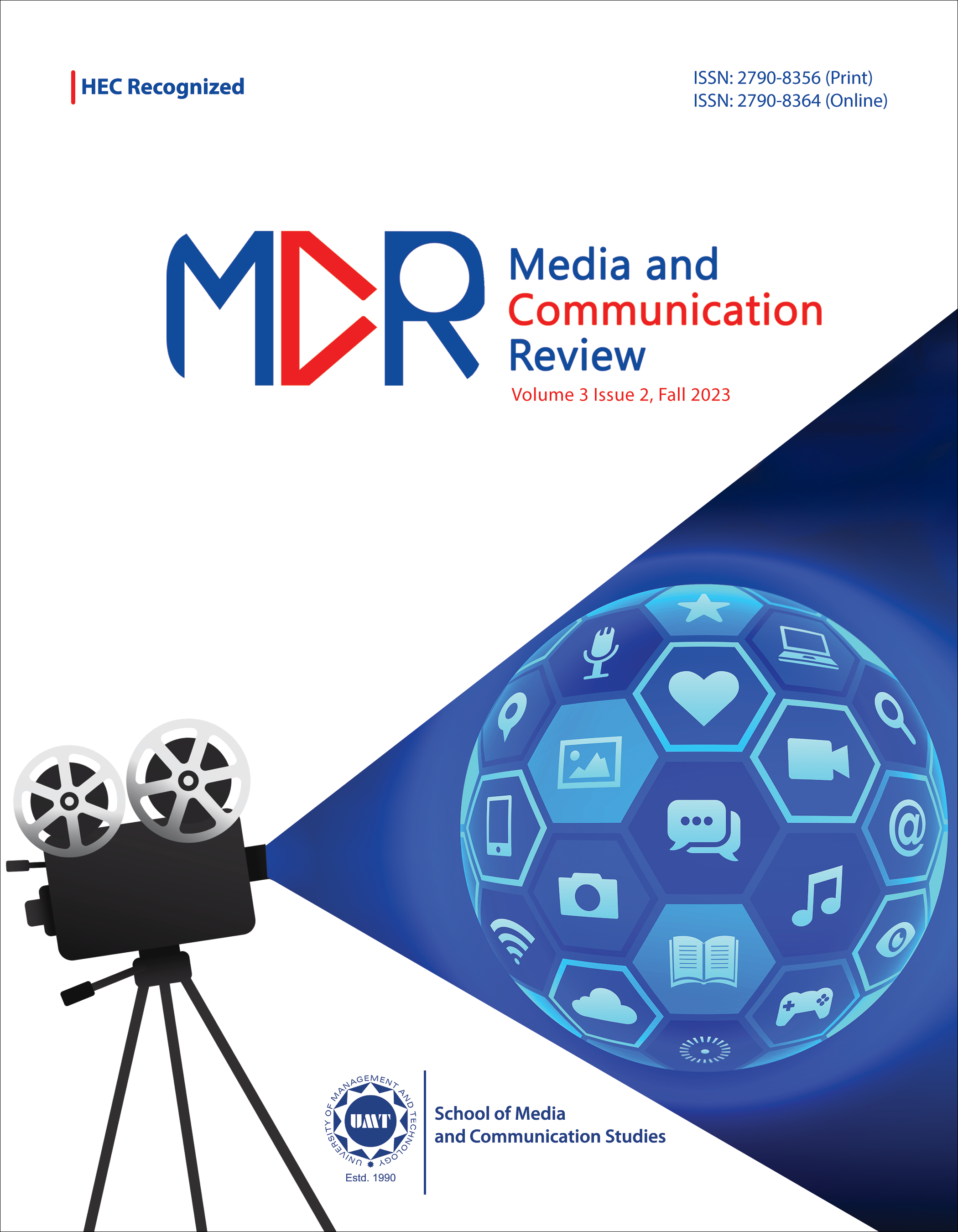Revisiting Climate Change News Coverage through the Cosmo Journalistic Relational Model – A Case Study of Pakistan
Abstract
 Abstract Views: 0
Abstract Views: 0
Climate change is a global issue because of its characterization as a universal, immeasurable and irreversible phenomenon that is producing natural disasters. The study draws on face-to-face, in-depth semi-structured interviews of Pakistani media professionals. The researchers employed a multi-stage model of case studies to identify the media professionals by using a networking sampling technique for the selection of the media professionals. The data was collected from 51 journalists working on environmental journalism in Pakistan. A thematic analysis of the transcribed data was performed. The study concludes that the rise and fall of news coverage from the national perspective cages social processes and actors within the national borders and ignores global processes and actors. The cosmo journalistic relational model suggests that the rise and fall in climate change news coverage is the result of both local and global social processes and actors.
Downloads
References
Afzal, T. (2010, May 12). Role of media in Pakistan. Ilm Ki Duniya. http://www.ilmkidunya.com/articles/role-of-media-in-pakistan-1069.aspx
Anderson, A. (2010). Communicating chemical risks: In J. Eriksson, M. Gilek & C. Rudén (Eds.), Regulating chemical risks (pp. 29–44). Springer. https://doi.org/10.1007/978-90-481-9428-5_3
Beck, U. (2009). World at risk. Polity Press.
Beder, S. (2002). Global spin: The corporate assault on environmentalism. Green Books.
Brossard, D., Shanahan, J., & McComas, K. (2004). Are issue-cycles culturally constructed? A comparison of French and American coverage of global cli- mate change. Mass Communication and Society, 7(3), 359–377. https://doi.org/10.1207/s15327825mcs0703_6
Castells, M. (2009). Communication power. Oxford University Press.
Castells, M. (2013). Communication power. Oxford University Press.
Chang, X., Wang, Z., Wei, F., Xiao, P., Shen, Z., Lv, X., & Shi, Y. (2021). Determining the contributions of vegetation and climate change to ecosystem WUE variation over the last two decades on the Loess Plateau, China. Forests, 12(11), Article e1442. https://doi.org/10.3390/f12111442
Chernilo, D. (2011). The critique of methodological nationalism: Theory and history. Thesis Eleven, 106(1), 98–117. https://doi.org/10.1177/0725513611415789
Coleman, J. S. (1982). The asymmetric society. Syracuse University Press.
Crona, B., Wutich, A., Brewis, A., & Gartin, M. (2013). Crona, B., Wutich, A., Brewis, A., & Gartin, M. (2013). Perceptions of climate change: Linking local and global perceptions through a cultural knowledge approach. Climatic Change, 119, 519–531. https://doi.org/10.1007/s10584-013-0708-5
Crossley, N. (2011). Towards relational sociology. Routledge.
Djerf-Pierre, M. (2012). The crowding-out effect: Issue dynamics and attention to environmental issues in television news reporting over 30 years. Journalism studies, 13(4), 499–516. http://dx.doi.org/10.1080/1461670X.2011.650924
Djerf-Pierre, M. (2012). When attention drives attention: Issue dynamics in environmental news reporting over five decades. European Journal of Communication, 27(3), 291–304. https://doi.org/10.1177/0267323112450820
Downs, A. (1972). Up and down with ecology: The issue attention cycle. Public Interest, 28, 38–50.
Emirbayer, M. (1997). Manifesto for a relational sociology. American Journal of Sociology, 103(2), 281–317. https://doi.org/10.1086/231209
Giddens, A. (1973). Images of society. Essays on the sociological theories of Tocqueville, Marx and Durkheim. The British Journal of Sociology, 24(3), 378–381. https://doi.org/10.2307/588241
Giddens, A. (1990). The consequences of modernity. Polity Press.
Hannam, K., Sheller, M., & Urry, J. (2006). Editorial: Mobilities, immobilities and moorings. Mobilities, 1(1), 1–22. https://doi.org/10.1080/17450100500489189
Hansen, A. (2011). Communication, media and environment: Towards reconnecting research on the production, content and social implications of environmental communication. International Communication Gazette, 73(1–2), 7–25. https://doi.org/10.1177/1748048510386739
Hansen, A., & Cox, J. R. (2015). The Routledge handbook of environment and communication. Routledge.
Harvey, D. (1990). The condition of postmodernity: An enquiry into the origins of cultural change. Blackwell.
Herod, A. (2001). Labor geographies: Workers and the landscapes of capitalism. Guilford Press.
Herod, A. (2010). Scale. Taylor and Francis.
Intergovernmental Panel on Climate Change. (2007). AR4 climate change 2007: Synthesis report. https://www.ipcc.ch/assessment-report/ar4/
Kvale, S. (2007). Doing interviews. Sage Publications.
Latour, B. (1992). The sociology of a few mundane artifacts. In W. Bijker & J. Law (Eds.), Shaping technology: Building society studies in sociotechnological change. MIT Press.
Marx, K. (1973). Grundrisse (Martin Nicolaus, Trans.). Penguin Press.
McComas, K., & Shanahan, J. (1999). Telling stories about global climate change: Measuring the impact of narratives on issue cycles. Communication Research, 26(1), 30–57. https://doi.org/10.1177/009365099026001003
Mikami, S., Takeshita, T., Kawabata, M., Sekiya, N., Nakada, M., Otani, N., et al. (2002, July 21–26). Unsolved conflict among Europe, Japan and USA on the global warming issue: Analysis of the longitudinal threads in news frame (Paper presentation). 23rd IAMCR Conference, Barcelona, Spain.
Ritzer, G. (2005). Encyclopedia of social theory. Sage Publications.
Robertson, R. (1995). Glocalization: Time-space and homogeneity-heterogeneity. In M. Featherstone, S. Lash, & R. Robertson (Eds.), Global modernities (pp. 25–44). Sage Publications.
Salam, A. (2018, July 24). Pakistan is ground zero for global warming consequences. USA Today. https://www.usatoday.com/story/news/world/2018/07/24/pakistan-one-worlds-leading-victims-global-warming/809509002/
Sassen, S. (2007). Sociology of globalization. W.W. Norton.
Sassen, S. (2008). Neither global nor national: Novel assemblages of territory, authority and rights. Ethics and Global Politics, 1(1–2), 61–79. http://dx.doi.org/10.3402/egp.v1i1.1814
Smith, J. A., Larkin, M., & Flowers, P. (2009). Interpretative phenomenological analysis: Theory, method and research. Sage Publications.
Smith, J. A., & Osborn, M. (2007). Interpretative phenomenological analysis. In J. A. Smith (Ed.), Qualitative psychology: A practical guide to research methods (pp. 53–80). London: Sage Publications.
Soderbaum, F., & Shaw, T. M. (2003). Theories of new regionalism. Basingstoke and new. Palgrave Macmillan.
Trumbo, C. (1996). Constructing climate change: Claims and frames in US news coverage of an environmental issue. Public Understanding of Science, 5(3), 269–283. https://doi.org/10.1088/0963-6625/5/3/006
Udehn, L. (2002). The changing face of methodological individualism. Annual Review of Sociology, 28(1), 479–507. https://doi.org/10.1146/annurev.soc.28.110601.140938
Urry, J. (2000). Sociology beyond societies: Mobilities for the twenty-first century. Routledge.
Urry, J. (2007). Mobilities. Polity.
Volkmer, I. (2014). The global public sphere: Public communication in the age of reflective interdependence. Polity Press.
Volkmer, I., & Sharif, K. (2018). Risk Journalism between transnational politics and climate change. Springer.
Washington, H., & Cook, J. (2011). Climate change denial: Heads in the sand. Earthscan.
Wimmer, A., & Schiller, N. (2002). Methodological nationalism and beyond: Nation-state building, migration and the social sciences. Global Networks, 2(4), 301–334. https://doi.org/10.1111/1471-0374.00043
Copyright (c) 2024 Kasim Sharif

This work is licensed under a Creative Commons Attribution 4.0 International License.




